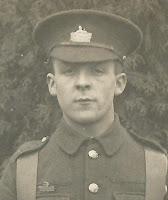 |
Lieut-General Hunter-Weston's message
of praise for his troops at the Somme
(the notes at the end are my grandfather's)
|
'It is impossible for me to come round all front line trenches and all billets to see every man as I wish to do. You must take the will for the deed, and accept this printed message in place of the spoken word. It is difficult for me to express my admiration for the splendid courage, determination and discipline displayed by every Officer, NCO and Man of the Battalions that took part in the great attack on the BEAUMONT HAMEL-SERRE position on the 1st July. All observers agree in stating that the various waves of men issued from their trenches and moved forward at the appointed time in perfect order undismayed by the heavy artillery fire and deadly machine gun fire. There were no cowards nor waverers, and not a man fell out. It was a magnificent display of disciplined courage worthy of the best traditions of the British race.'
 |
Lieut-General Alymer
Hunter-Weston: history
has not judged him kindly
|
THE GENERAL
'Good-morning; good-morning!' the General said
When we met him last week on our way to the line.
Now the soldiers he smiled at are most of 'em dead,
And we're cursing his staff for incompetent swine.
'He's a cheery old card,' grunted Harry and Jack
As they slogged up to Arras with rifle and pack.
But he did for them both by his plan of attack.
 |
Pte Edwin Wood -
my grandfather
|
It would be interesting, however, to hear my grandfather's opinion. As a volunteer soldier, Private Edwin Wood willingly enlisted to fight for King and country and was obviously proud to have in his possession Hunter-Weston's letter, otherwise he would not have kept it. Not all soldiers viewed the conflict in the same way as Sassoon and his fellow war poets. Men like my grandfather saw it as their duty to follow orders without question and accept their fate without protest. And - however heavy the price, and whether or not it was justified - this was the attitude that won the war.
Perhaps Hunter-Weston's message was nevertheless distributed to all men of the 48th division. Or maybe this one was actually sent to Edwin's younger brother, Private Fred Wood, who served with the 1st Battalion, the Somerset Light Infantry. His battalion was also under Hunter-Weston's command and Fred was one of the first to go over the top on the first day of the Somme. But sadly he never returned and after initially being posted missing in action, he was eventually presumed dead.
If the General's letter was, indeed, intended for Fred, then it may have been kept by my grandfather as an epitaph to his 19-year-old brother who sacrificed his life on that terrible day... 'There were no cowards nor waverers, and not a man fell out. It was a magnificent display of disciplined courage worthy of the best traditions of the British race.'
You can read more about the experiences of ordinary soldiers like Edwin and Fred Wood in my book Letters from the Trenches.
 |
| Private Fred Wood, missing in action |
Bless the memory of these heroes and their ultimate sacrifice.
ReplyDelete